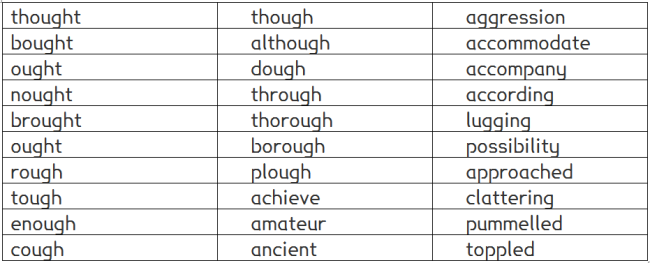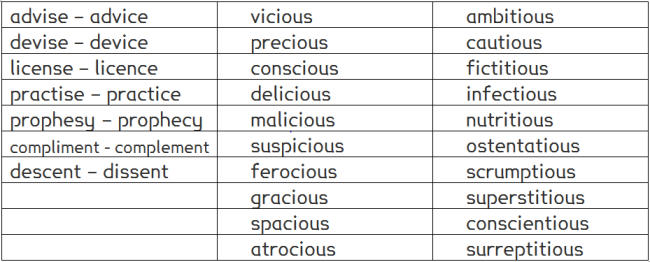17 June 2016
|
ei words and homophones |
||||
| This week, we have a combination of words with ei in, as well as some more homophones. | ||||
| deceive | receive | ceiling | ascent – assent | cereal – serial |
| conceive | perceive | weird | bridal – bridle | alter – altar |
What other words can children find that have ei in? Lots come after a c, but some don’t. Homophones should always be practised in sentences.
10 June 2016
This week’s spellings have been chosen by the children and me because they’re words we’ve noticed lots of us make mistakes on. These spellings will be tested on Friday 17 June.
- favourite
- colour
- excited
- excellent
- different
- altogether
- absolutely
- definitely
- necessarily
- minutes
Summer Half Term
In line with our Homework Policy, there are no homework tasks or spellings to learn next week because it’s the Summer half-term holiday. Of course, there are plenty of ways to help your child continue learning: get reading, go places, talk lots!
Have a happy and healthy holiday.
20 May 2016
This week’s spellings link to our themed ‘Money Week’ and will be tested on Friday 27 May.
- expensive
- extortionate
- discounted
- bargain
- accumulate
- contribute
- squander
- currency
- income
- earnings
As we’re going to be developing our understanding of money next week – what it’s worth, where it comes from, where it goes – it is just as important that the children explore what these words mean as well as how they are spelled.
13 May 2016
This week’s spellings are to practise changing …ble to …bly. Note how each word initially ends in ‘e’ but this is removed when the ‘y’ is added.
- possible, possibly,
- impossible
- horrible, horribly,
- terrible, terribly,
- visible, visibly,
- invisible
- incredible, incredibly,
- sensible, sensibly
These words will be tested on Friday 20 May but, don’t forget, the point of learning these spellings is to spell them correctly – not to do well in a test!
The words have now been added to Spellodrome so there are plenty of different ways we can practise our spellings.
06 May 2016
This week’s spellings mainly focus on words with the ‘erred‘ spelling pattern with some other odd double ups included. Ten of these spellings will be tested on Friday 13 May.
- referred, reference, referee
- preferred, preference, preferring
- transferred, transferring, transference
- interrupt, interrupting, interrupted
- necessary, unnecessary
- assistance, assistant, assisted, assisting
Don’t forget: it’s really important to learn what these spellings mean, how to use them in a sentence and be able to spell them beyond a test.
29 April 2016
This week’s spellings focus on the double up rule and will be tested on Friday 6 May.
- recommend
- immediately
- community
- communicate
- excellent
- embarrass
- opposite
- accompany
- correspond
- aggressive
It’s important to practise spellings regularly so that they are learnt and not just remembered for a week in order to score well in a test. We’ve created lots of different ways to practise our spellings in class that can be done at home and, don’t forget, we now have Spellodrome to use at home. Any feedback on this resource would be greatly appreciated.
22 April 2016
This week’s spellings will cover two different areas. Our main spelling list focusses on plurals and the different rules we need to follow when adding ‘s’. However, the children will be asked to write a sentence for their test on Friday which will include a homophone that they’ll be required to spell correctly.
- the laboratory – 10 laboratories
- one photocopy – 6 photocopies
- my memory – lots of memories
- large chimney – 2 large chimneys
- the display – 5 displays
- nice accessory – multiple accessories
- one wolf – a pack of wolves
- a knife – sharp knives
- a cliff – some cliffs
- delicious loaf – tasty loaves
We’ve discussed homophones throughout the week, particularly those we often get wrong: their, there, they’re; of, off; here, hear; to, two, too. See how many you can think of and have fun with it. We managed to think of a group of four homophones; can you? How many lists of three can you come up with? Time yourselves and see who can write the greatest number of pairs of homophones in 30 seconds.
24 March 2016
This week’s spellings will test how well children are retaining information they are learning by focussing on spellings covered across the year so far.
There have been many different spelling rules and patterns explored up to this point in the year. Next week’s test will be from the spelling lists learnt in the first half term (07.09.15 – 23.10.16). Children should look over these lists and note the patterns we learnt about, picking out words they think they found most tricky at the time.
Ten spellings from this list will be tested as children are not expected to learn spelling simply for a test but for long term use of these words.


18 March 2016
Spellings this week are not one specific list. The children have gone through their English book and picked out words they have spelt incorrectly in the past in order to learn these and not make the same mistake again.
It’s best if ten minutes of each day is given to practising spellings and we’ve looked at lots of different ways in which we can practise in class.
- word shapes
- word pyramids
- missing vowels
- create a crossword
- make it into a wordsearch
- good old look, write, cover, check.
These spellings will be tested on Thursday 24 March.